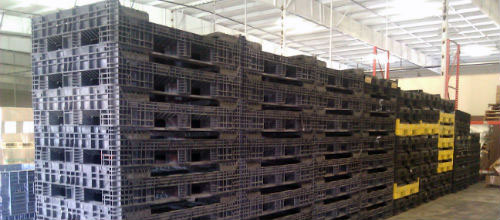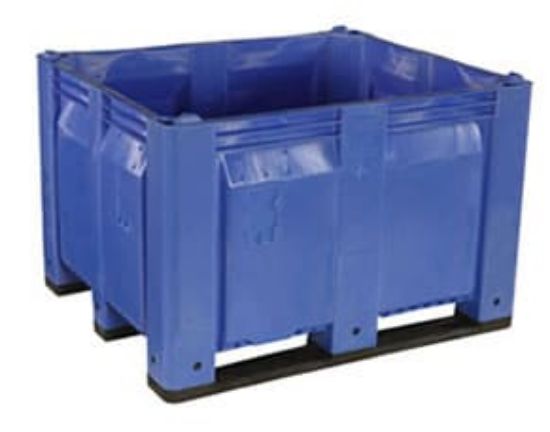How used collapsible bulk containers support cost-effective operations
The Ultimate Overview to Choosing the Right Mass Containers for Your Business Requirements
Picking the suitable bulk containers is vital for any type of service that depends on reliable logistics. Numerous kinds of containers exist, each created for specific products and applications. Variables such as dimension, product compatibility, and governing standards play a considerable duty in this decision-making process. Recognizing these components can result in improved operational performance. Numerous companies ignore vital aspects that can enhance their general performance and sustainability. What are these considerations?
Understanding Different Kinds of Mass Containers
Bulk containers offer as important tools for organizations seeking reliable storage and transport solutions. These containers come in different kinds, each made to meet certain functional needs. One usual type is the intermediate mass container (IBC), which is ideal for granulated and liquid materials, supplying an equilibrium of capability and maneuverability. An additional prominent alternative is the bulk bag, or FIBC, ideal for dry, flowable products. These flexible containers are lightweight and can be quickly moved and saved. For much heavier materials, stiff mass containers are usually used, providing sturdiness and security for safe handling. In addition, there are customized containers customized for unsafe materials, making certain conformity with safety and security guidelines. Recognizing the distinctive attributes of these bulk container types allows companies to make informed decisions that maximize logistics and decrease expenses. By picking the right container, business can boost their operational effectiveness and improve their supply chain processes.
Trick Material Considerations for Mass Containers
When selecting bulk containers, it is necessary to consider the products made use of in their building. Variables such as strength, durability, and chemical compatibility play an important role in ensuring the containers satisfy particular operational needs. In addition, weight and mobility worries can impact both effectiveness and transportation logistics.
Material Resilience and Strength
Longevity and stamina are crucial factors in selecting products for mass containers, as they directly affect the container's capacity to hold up against different environmental problems and handling procedures. Products such as high-density polyethylene (HDPE), polypropylene, and stainless steel are commonly preferred for their durable residential or commercial properties, providing resistance to impact, abrasion, and temperature level variations. The option of product additionally affects the general life expectancy of the container; stronger materials normally cause less frequent substitutes, bring about cost savings gradually. Additionally, the weight of the material can impact shipping prices and simplicity of handling. Companies must consider their particular operational atmospheres and the possibility for wear and tear to ensure peak durability and stamina in their bulk container selection.
Chemical Compatibility Elements
Recognizing chemical compatibility is essential for choosing mass containers, as the products utilized need to stand up to the specific materials they will hold. Various elements influence compatibility, including the chemical nature of the components, temperature level, and duration of storage. Harsh chemicals may call for containers made from stainless steel or specialized plastics that withstand degradation. In addition, responsive substances can create warm or gases, necessitating vented or pressure-rated containers. The selection of container material, whether steel, polyethylene, or polycarbonate, need to line up with the chemical residential properties of the saved compounds to stop leakages or breaches. Inevitably, a thorough examination of these compatibility variables guarantees secure handling and storage, protecting both personnel and the atmosphere while preserving item integrity.
Weight and Portability Problems
Picking bulk containers involves not just evaluating chemical compatibility yet likewise taking into consideration weight and portability. Services must evaluate the convenience of handling and transport to enhance effectiveness. Lightweight materials like high-density polyethylene (HDPE) or light weight aluminum can promote easier activity and lower shipping expenses. Conversely, much heavier containers might give enhanced resilience however can impede flexibility, specifically in atmospheres requiring frequent moving. In addition, the design of the container should enable convenient lifting and stacking, making sure ergonomic safety and security for workers. Firms must additionally think about the infrastructure offered for transportation; as an example, containers suitable with forklifts or pallet jacks can enhance procedures. Eventually, the appropriate balance in between weight and portability directly affects operational performance and cost efficiency.
Sizing Your Mass Containers for Ideal Performance
When sizing bulk containers, companies need to carefully evaluate the dimensions called for to suit their certain items. In addition, weight capability is a vital factor that influences efficiency and security throughout transportation and storage space. Efficient sizing not only takes full advantage of area however likewise enhances functional operations.
Figuring Out Container Dimensions
Choosing the appropriate dimensions for mass containers is crucial for optimizing efficiency in storage and transport. Companies should examine their particular needs, considering aspects such as available room, the nature of the items being stored, and the techniques of transportation made use of. Precise dimensions assure that containers fit preferably in storage facilities and automobiles, decreasing squandered area and minimizing dealing with time. Criterion sizes can provide benefit, yet customized dimensions may be necessary for unique needs or to accommodate certain items. Additionally, it is very important to examine stacking abilities and ease of access, as these elements affect general functional performance. Ultimately, the ideal dimensions lead to boosted company and streamlined logistics, benefiting the overall efficiency of business.
Weight Ability Considerations
Comprehending weight capacity visit the website is essential for businesses aiming to optimize their bulk container effectiveness. The weight ability of a container directly influences storage abilities, transport logistics, and overall operational expenses. Picking containers with the proper weight restrictions assures that companies can safely keep and carry their goods without taking the chance of damage or compliance issues. Straining containers can result in structural failures, while underutilizing ability outcomes in thrown away resources. When choosing containers, it is important for organizations to assess their item weights and take into consideration any regulatory requirements. Additionally, elements such as the type of material, meant usage, and ecological problems should additionally influence weight capability choices. By evaluating these components, organizations can boost performance and assure a structured supply chain.
Regulative Conformity and Safety And Security Requirements

Regulatory compliance and safety standards play an essential duty in the choice of mass containers for organizations. Organizations has to ensure that their containers satisfy numerous policies set by regional, national, and global authorities. These standards usually refer to material safety and security, structural integrity, and correct labeling, which aid avoid crashes and assure the risk-free transport of click to find out more goods.
Additionally, adherence to industry-specific guidelines, such as those from the Fda (FDA) or the Occupational Safety And Security and Health Administration (OSHA), is vital for business dealing with unsafe materials or foodstuff. Non-compliance can cause penalties, legal problems, or damages to a business's online reputation.
Companies need to likewise think about the container's compatibility with the products being saved or carried to stay clear of contamination or chemical reactions (used collapsible containers). To summarize, recognizing and applying regulatory conformity and safety standards is important for the liable and efficient usage of bulk containers
Sustainability Alternatives for Eco-Friendly Mass Containers

Companies are additionally checking out choices made from recycled materials, which not just preserve resources yet likewise support the reusing market. In addition, developments in layout enable lighter containers that require much less energy to transport, additionally enhancing sustainability. By incorporating these eco-friendly bulk container choices, organizations can show their commitment to environmental stewardship while fulfilling consumer demand for sustainable methods. This change not only aids the earth but can likewise improve brand name track record and consumer loyalty.
Cost-Effectiveness and Budgeting for Bulk Containers
While numerous companies concentrate on sustainability, cost-effectiveness continues to be a crucial aspect when picking bulk containers. Find Out More Organizations has to assess the preliminary acquisition rate, along with long-lasting functional prices, to guarantee financial viability. Variables such as toughness, reusability, and maintenance play a substantial duty in figuring out general expenses.
Purchasing top notch containers might generate higher in advance costs yet can lead to financial savings through reduced replacement rates and reduced waste. Furthermore, businesses need to take into consideration transportation expenses and storage efficiency, as these can influence the total budget plan.

Regularly Asked Concerns
How Do I Establish the Right Container for Hazardous Materials?
To determine the best container for dangerous materials, one should evaluate compatibility with the compound, consider the container's material, look for governing compliance, and evaluate capability and safety and security functions to assure proper handling and storage.
Can Mass Containers Be Custom-made for Particular Products?
Yes, bulk containers can be tailored for details products. used collapsible containers. Various features, such as product, size, and style, can be customized to meet distinct demands, making certain ideal safety and security and efficiency for delivering and storing different products
What Is the Average Life Expectancy of Various Mass Container Kind?
The average lifespan of bulk container kinds differs; plastic containers last 5-10 years, steel containers 10-20 years, and wooden containers usually last 3-7 years, relying on usage, upkeep, and environmental problems.
Just how Should I Clean and Maintain Bulk Containers?
To clean and maintain bulk containers, one should routinely inspect for damage, remove residue, wash with ideal detergents, wash thoroughly, and warranty appropriate drying before storage. Following maker guidelines boosts long life and safety during usage.
Exist Rental Options for Bulk Containers Available?
Yes, countless firms supply rental options for bulk containers, giving flexibility for organizations. These rentals can fit different demands, allowing firms to handle supply efficiently without the commitment of purchasing containers outright.
Longevity and strength are critical variables in picking products for bulk containers, as they directly influence the container's capability to hold up against various ecological problems and taking care of procedures. Understanding chemical compatibility is vital for picking mass containers, as the materials utilized should stand up to the specific materials they will certainly hold. Comprehending weight ability is crucial for companies intending to enhance their mass container efficiency. Regulatory compliance and safety and security standards play an essential duty in the choice of mass containers for companies. While numerous services concentrate on sustainability, cost-effectiveness continues to be a crucial element when selecting bulk containers.